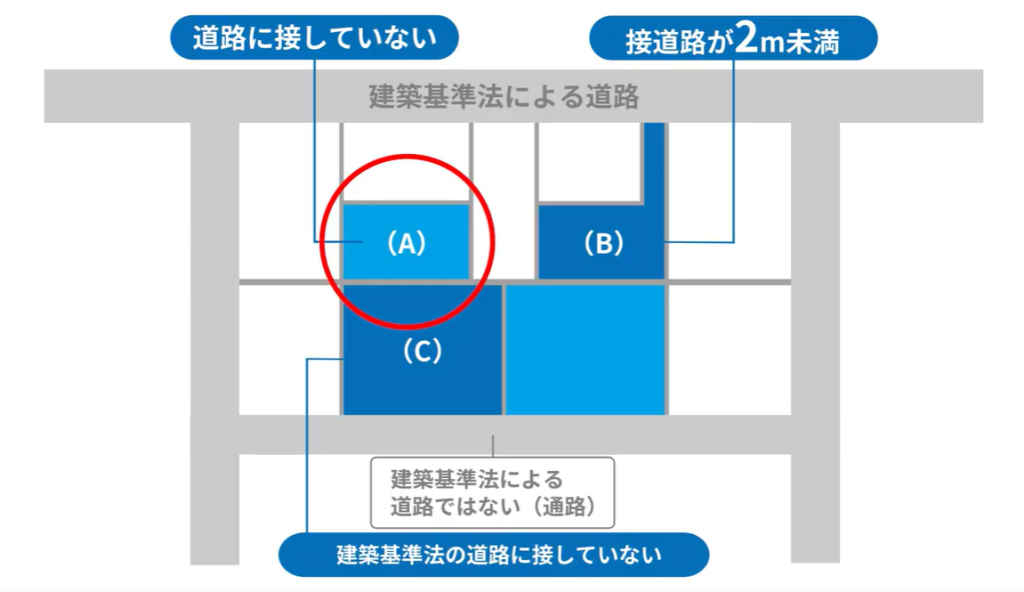
Thank you for visiting us.
This is conspi public relations.
This time, it was distributed on CONSPIRIT's official channel on YOUTUBE.Episode 30: Boost your quality of life with real estate management!I would like to send you the contents.
Today, I would like to talk about "non-rebuildable properties."
The yield on non-rebuildable properties is said to be quite high, but what is the reality?
What is a non-rebuildable property?
A non-rebuildable property is exactly what the name suggests: a property on which the current structure cannot be demolished and a new building constructed.
This is related to the requirement to have access to a road under the Building Standards Act.
The road access requirement is a rule that states that "when constructing a building, the land must have access to a road that is at least 4m wide and is at least 2m wide."
These rules are in place to allow emergency vehicles such as fire engines and ambulances to pass smoothly, and they make sense in terms of protecting cities and towns from disasters.
If it does not meet the road access requirement, then you may be asking, "Then why is it being built in the first place?"
This is because the Building Standards Act came into effect in 1950 and the City Planning Act came into effect in 1968, meaning that buildings built before the area was designated as a city planning area ended up not fulfilling the road access requirement.
Main examples of properties that cannot be rebuilt
Let's look at some main examples of properties that cannot be rebuilt.

A's land simply does not have access to any roads.
Although land B has access to a road, the width of the road is less than 2m, so it does not meet the condition.
Although C's land fronts a road more than 2m wide, the road in question is less than 4m wide and is not considered a road under the Building Standards Act.
Generally speaking, I think the above patterns are common.
Why are the returns on non-rebuildable properties so high?
So, why are the returns on non-rebuildable properties so high?
It is not difficult to imagine that the inability to rebuild means that the land has low collateral value.
Therefore, since the hurdle for obtaining financing to purchase is very high, the offering price is naturally low.
From the tenant's perspective, even if the road access is a little poor, it should not cause much of an inconvenience to their life, so if the location is good, there is likely to be no difference in rent.
On the other hand, from the owner's perspective, the hurdles to acquisition are extremely high, which keeps prices down and inevitably results in high returns.
What is it really like to have a property that cannot be rebuilt?
So, what is the reality? To sum up, I think that unless you are a very experienced landlord, you should not get involved in this easily.
It is true that the good location and high return on investment are attractive, but there is no doubt that the property is old and rebuilding or expansion/renovation is prohibited, making it extremely difficult to handle.
Even if the site were converted into a parking lot or material storage area, it would be difficult for vehicles to enter in the first place, and even if one were to renovate the site, it would be difficult to transport waste materials and supplies because of the poor road layout, which would result in high costs.
Additionally, one of the sales pitches used when promoting non-rebuildable properties is that you can aim for capital by selling it to or purchasing the neighboring land.
This would be great if the negotiations went well, but even if you try to sell, the owner of the neighboring land naturally knows that it will be difficult to find a buyer other than you, so there is a high possibility that you will be forced to sell at a low price.
When purchasing, they will know that their land is essential for the landscaping, so there is a good chance that they will overcharge you.
If it was a gamble, I wouldn't stop it, but if you think about it logically,
To be honest, I think it is probably dangerous to easily get involved in a property that cannot be rebuilt.
Learn about real estate management
If you likeConspirit official channelPlease also take a look.
Please subscribe to the channel and give us a high rating!
Well then, it was Conspi PR!
The person who wrote this blog
conspirit public relations
We disseminate information both internally and externally to improve our company's awareness and brand power. We conduct promotional activities by clarifying reach methods based on market, competitor, and company research and analysis.
